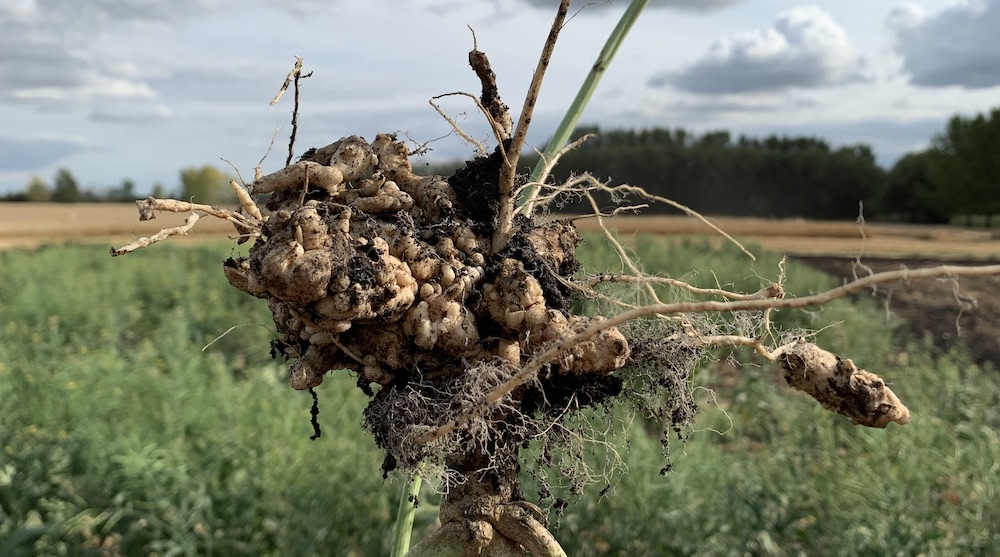Clubroot comes in many varieties, or pathotypes, and the ones that have been circulating in recent years have largely broken through the defenses of Gen 1 resistant canola varieties, says Lucas Bell, an agronomist and Sales and Marketing Manager at McEwens Fuels and Fertilizers in Fort Saskatchewan.
Clearly, a new approach is needed.
“In certain areas we’re moving to strictly Gen 2-resistant (new sources) hybrids and multi-genetic resistant hybrids as part of our recommended management strategies,” he says. “DEKALB has been a big contributor to providing local farmers these genetics.”
Whether clubroot is in fields today or a threat for next year, the disease is here to stay. Farmers need to know how to effectively manage this disease, which includes selecting the right seed.
“Early on when we didn’t have resistant hybrids, there wasn’t much you could do about clubroot other than not grow canola on infected fields,” says Tim Darragh, Canola Technical Strategy Lead at Bayer.
“Often by the time you noticed it, infected areas were significant and you were in trouble. This led to a build-up in spore load within those fields and with higher spore loads there was a greater opportunity for new or different pathotypes to cause infection, leading to eventual breakthrough on the initial resistance source. But now, through continued research, we’ve been able to identify new sources of resistance and combine those with our elite germplasm. This means with DEKALB hybrids, you’re still able to grow a high yield-potential canola crop despite the presence of new pathotypes in your fields.”
Screening never ends
Researchers at the University of Alberta have now identified at least 43 pathotypes, and as Darragh explains, screening for resistance must therefore be ongoing.
“We run a number of field disease-screening nurseries and we also test against some of the newer pathotypes at our breeding facility in Winnipeg,” he says. “We are actively bringing in new genetic resistance from a growing number of sources and ensuring that resistance lasts as long as possible.”
Leading canola disease research at Bayer in Canada is Xuehua Zhang, Senior Canola Pathologist. She explains that improving clubroot resistance, while unlocking high yield potential, requires a comprehensive approach. This includes identifying new sources of genetics, incorporating effective clubroot-resistant traits using advanced breeding techniques, and rigorous testing.
“Bayer has expanded its controlled environment clubroot disease screening resources to better characterize resistance against a wider range of pathotypes with further expansion coming,” Zhang says.
“Today, more than 50 per cent of the DEKALB clubroot-resistant canola hybrids offer newer source of clubroot resistance, either in a single-gene or multi-genetic manner. These hybrids offer robust resistance against the predominant clubroot pathotypes, demonstrating the potential to protect the crop from clubroot infection even under extremely high disease pressure.”
An example is the DK901TF hybrid, which provides strong clubroot resistance against pathotypes 3A, 3D, 3H and more.
“This resistance has been confirmed in disease nurseries located in the central clubroot zone and is highly recommended for areas with high clubroot disease pressure,” Zhang says.
Using multiple strategies to protect yields
Using multiple management strategies is more important than ever with clubroot in canola. This could also help prolong the longevity of new hybrids, according to researchers like University of Alberta PhD candidate Keisha Hollman.
Don’t forget to scout, especially field entrances and low spots. Control host weeds like volunteer canola. Always clean equipment between fields, including your boots. A small amount of soil can contain billions of clubroot spores.
“Farmers want to get canola in the rotation as much as possible but going to three-year rotation instead of two-year makes a huge difference,” Darragh says. “Spore load drops about 90 per cent when you do that. Especially in high spore-load regions or those with new pathotypes, a minimum three-year rotation is highly recommended.”
“Lastly, your seed decision matters. This year, we were proud to offer 11 DEKALB clubroot-resistant canola hybrids, with six providing full coverage of the three predominant clubroot pathotypes,” he says. “Talk to your local rep about which one is right for your fields.”
For more information, visit: www.DEKALB.ca/canola










